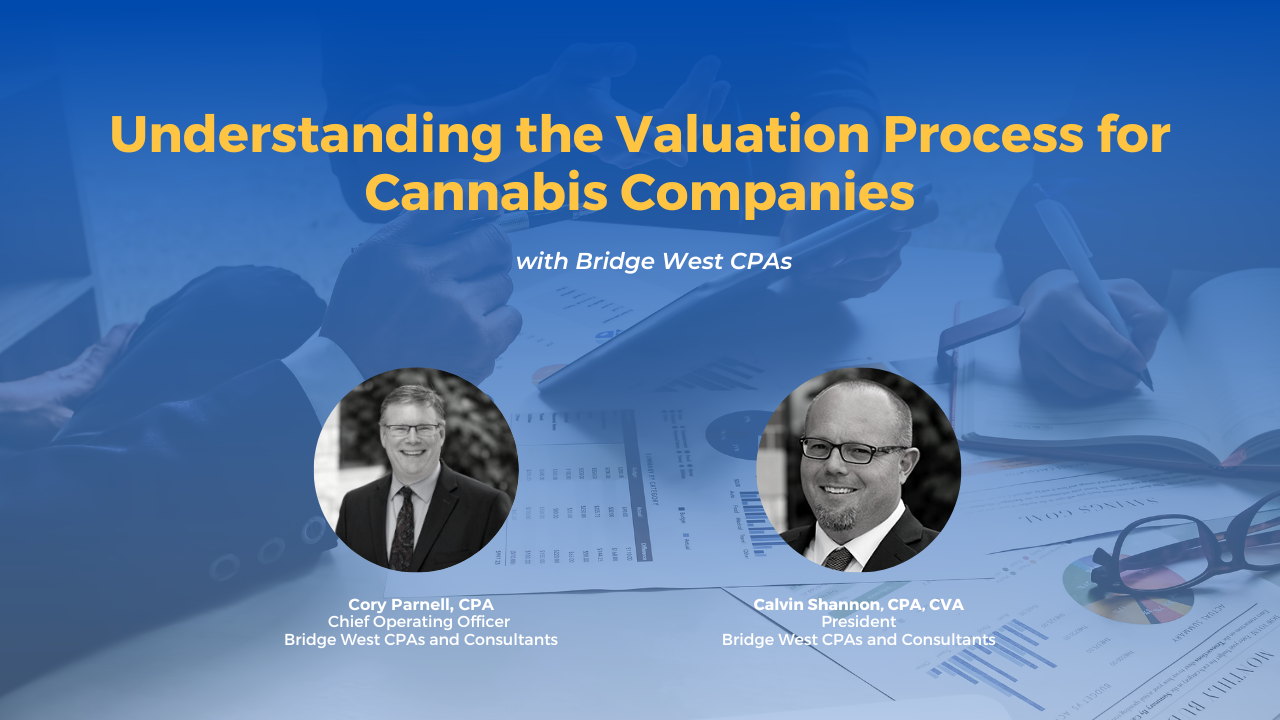Understanding the Valuation Process for Cannabis Companies with Bridge West CPAs



It can be challenging to determine the worth of an early-stage cannabis company, yet, it is a vital component to the success of your capital formation process, especially if your firm is pre-revenue.
Potential investors must understand the worth of your firm to assess risk and potential return. Your valuation should have a credible format with industry-standard methods and references.
Discover how to determine your company’s valuation with Calvin Shannon, CPA, and Cory Parnell, CPA, CVA, of Bridge West LLC, two prominent business finance specialists with 25 years of expertise.
During our one-hour webinar, you’ll learn:
- Why would a cannabis company need a valuation?
- What is the “Standard of value” and why is it important?
- How is a valuation performed?
- What information is considered?
- What approaches are used when valuing a cannabis company?
- What services do valuation professionals provide?
- What is a 409A valuation?
You’ll also learn the lingo of company valuations – DCF, NPV, Multiples, Comps, COG, CAC, Cash Burn, WACC, Runway, Weighted Averages – and discover who should calculate the valuation and when.
Webinar Highlights
Why Would A Cannabis Company Need A Valuation?
00:03:16 – 00:07:08: MediaJel and Calvin Shannon, the President of Bridgewest, discuss the importance of valuations for cannabis companies. Calvin Shannon talks about why these companies may seek valuation services and the common scenarios where these services would be helpful including:
- Selling all or partial interest in the business
- Equity compensation through stock options
- 409 valuations
- Disputes related to litigation
- Insurance claims for lost revenue or decreased business value
- Buy/Sell agreements
- Changes in business structure
- Tax purposes
Calvin also highlights estate and gift taxes as a less common but relevant need, especially as the cannabis industry matures. Valuations are necessary for financial reporting compliance, particularly in the context of GAAP (Generally Accepted Accounting Principles) or IFRS (International Financial Reporting Standards).
How is a Business Evaluation Performed?
00:18:28 – 00:22:33: MediaJel and Calvin Shannon delve into the core aspects of business valuation, including the key steps and considerations involved in Calvin’s process. He emphasizes that valuation is both an art and a science, involving tangible and intangible factors. At a high level, the valuation professional gathers relevant information about the business entity and employs three commonly used approaches for the calculation: tangible factors, intangible factors, and market conditions.
The tangible factors are financial information, assets, liabilities, and operating results. He characterizes these as the “science” of valuation. Assessing intangible factors involves understanding the entity’s strengths, weaknesses, management structure, competitive advantages, and disadvantages. They also review industry-specific considerations, including the broader economic environment.
Calvin touched upon some specific challenges affecting the cannabis industry, including federal legality, tax implications, limited jurisdiction licenses, and the impact of economic conditions. The discussion highlights a diverse range of factors that can influence the final valuation.
Three Approaches to Value a Cannabis Company
00:22:28 – 00:24:31: MediaJel and Calvin Shannon focus on the approaches when valuing a cannabis company. The three traditional approaches for valuing privately held companies are the asset, income, and market approaches. Considering all three approaches, Calvin suggests combining approaches to reach a more comprehensive valuation.
Calvin explains that the asset approach calculates a business’s value by determining its assets’ net value after subtracting liabilities. This approach is particularly relevant for non-operating companies, such as those holding real estate without engaging in active operations. For businesses actively operating, like many cannabis companies, the asset approach may provide a minimum value.












